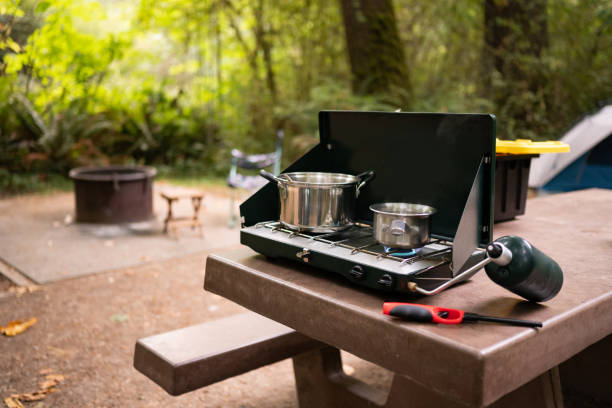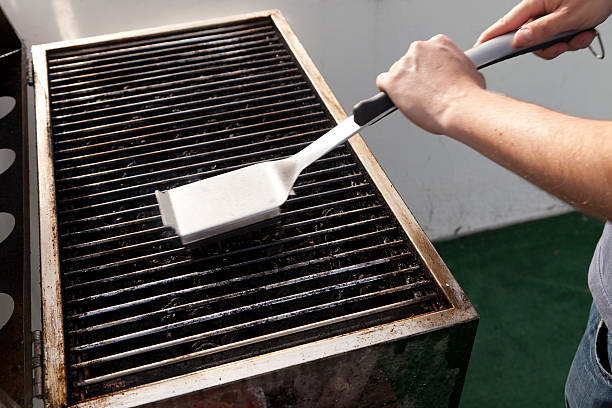
Charcoal Vs. Propane Grill has been a lengthy debate throughout the years with all campers having different opinions on taste, health reasons, speed, cost, and other factors associated with these two forms of cooking. Understanding the pros and cons of both types, you will be able to identify which one is better for you and the camping trip.

Popup campers
When choosing to buy a popup camper there are a number of things you must understand that relate to how you are going to cook your food. Sure, a popup camper can contain several methods to cook food from a campfire, oven, microwave, portable grill, and stove. You the owner can choose to cook indoors or out. Those who are lucky to have all these items included with their camper are considered lucky. Many popup camper owners purchase these items separately and depending on their personal choice and budget can also expect to pay a pretty penny.
I prefer not to cook in my popup camper, it can make the canvas smell funky over time and leave a grease film over it. You can cook propane in your popup camper if you choose but of course not charcoal. I prefer to also use charcoal with the grills provided by the campsite or my personal charcoal grill and never in the fire pit. To me, it is a safety concern and with little children and dogs around I get worrisome. I also prefer to keep the grill away from the camper at least a distance of 10 to 20 feet. Though I have a propane and charcoal grill I usually leave the charcoal grill behind. It is bulkier and takes up space in my popup camper, which we all know space is a premium.
Transportation of each product is different as well will you need to be safe with both charcoal and propane in a hot vehicle worrying more about combustion in the hot summer months is a real concern. But a small bottle of propane is lighter and can fit easily in your traveling car or camper while a big bag of charcoal is bulky, dusty, and takes up some room depending on the size you buy.

Prices and amount required
Fuel is one of those “required” items needed for cooking food. Whether it be propane, charcoal, wood, or electricity, these items will remain with camping for life.

Depending on the amount of food you will be cooking propane might be your best choice. Propane cooking elements allow you to turn off the grill when completed and reignite it when ready to cook again. Allowing you to control the amount of fuel being used. The price of propane varies throughout the year but remains around $4 dollars for a Coleman 1lb Propane Cylinder. A large number of people use around 1/4 lb. of propane per day for cooking.

Charcoal on the other hand is one-time use and will require lighter fluid or pricier charcoals to ignite. Once the charcoal is lit you have a time frame to use them. Once they are burnt out, you will need to open another bag to start another cooking process. While Charcoal and lighter fluid can run around $10 for a 20lb. bag or more for the self-starting charcoals. Many campers will use around 15-20 coals for minor tasks and 30-40 or more for longer tasks. This will depend on the amount of food cooking and the duration of time it needs to cook for. You can only reuse charcoal up to 2 to 3 times before a new bag can use, you just need a lot of liter fluid and patience.
We find our costs were for each are:
Propane .85 cents per meal
Charcoal $1.5 per meal (using pre-lite charcoal Briquettes)

Maintaining the grilling temperature
Sustaining the grilling temperature is important to cooking the food properly and maintaining a level of heat that will not cause bacteria to grow on the food nor burn the food entirely.

Charcoal
Retaining the charcoal temperature is all about managing the exhaust and intake dampers of the charcoal grill. You should also pay attention to your coals’ color and duration of heat. If you want less heat, you need to add the charcoals gradually. But if you prefer a more intense heat, you’ll need to add additional charcoals frequently. It’s also crucial to adjust the exhaust and intake dampers often to control airflow.

Propane
Depending on the heating element, for example, a grill or portable cooking component, each unit will come with temperature control knobs or additional heat settings that will allow you to choose what temperature setting or propane flow you desire. This will allow you to have low to high heat situations and a way you can turn off the flow of propane quickly, eliminating propane waste.

Taste
If you grill for long or slow periods of time, there is a strong noticeable difference in flavor with charcoal. The distinctive smells from the burning gases created by the charcoals when mixed with smoke from wood chips. On a propane grill, the taste is much milder needing more seasonings to give it a smoky taste. We find we love the charcoal flavor better for grilling meats and vegetables. We see no taste difference between propane with meats and must add additional ingredients to make the food pop. Though we would rather prefer cooking on propane when it comes to larger meals like pasta or potato dishes, desserts, and quick meals.

Clean up
Propane is easier to clean up and you can recycle the bottle and, in most cases, refill them for further use. Charcoal on the other hand has to be cleaned up and can leave your clothes stained if you’re not careful. Those who are staying at campsites are reminded of good housekeeping procedures and asked to clean up their charcoal, ashes, and unused fuel sources before leaving.

Convenience
I feel that the propane grill is more convenient than the charcoal one because it is quicker to light and heat to an appropriate temperature to start cooking, taking only seconds to use. Usually, it would take longer to light the charcoals, keep them lit and get the grill to temp before I could even start cooking.
I can even cook more than one item at different temps with my girl that has a flat burner and 2 other heating elements. Charcoal grills don’t have that option, and I would have to cook them all at the same temperature.
Though eventually, I could run out of propane if using it long-term, while charcoal could retain heat longer.

So which option do you prefer when camping? For us, that would depend on the length of our trip. It is far different, for each trip. We will usually use both methods of cooking when we are on longer camping trips, when it is short weekend trips, I will pull out the trusty propane tank. Good luck with your cooking adventures!!!


